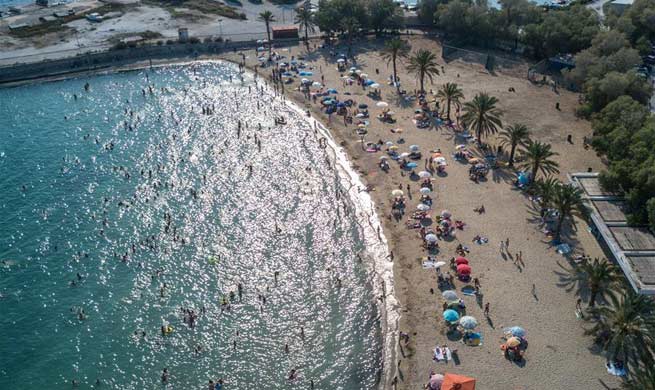by Will Koulouris
SYDNEY, June 26 (Xinhua) -- Australia's Great Barrier Reef has been valued at 56 billion Australian dollars (42.44 billion U.S. dollars) on Monday, according to a new report into the economic benefits provided by one of the country's most iconic tourism destinations.
The Deloitte Access Economics report detailed comprehensive findings on the economic impact that the Great Barrier Reef has not only directly, but subsequently indirectly in the form of employment, and other associated financial benefits it provides.
In the 2015-2016 financial year, the report said the total economic contribution to Australia by the Great Barrier Reef was 6.4 billion Australian dollars (4.84 U.S. billion dollars) in value added, along with 64,000 associated jobs.
Lead author of the analysis John O'Mahony, a partner at Deloitte Access Economics, told Xinhua on Monday that one of the main things that he discovered in the course of compiling his report was his own realization of just how significant of an economic and social asset the Great Barrier Reef had become.
"We've done these studies before about the economic contribution to the gross domestic product (GDP), and that part obviously didn't surprise us. It found that the Great Barrier Reef employs a lot of people indirectly of course through tourism and it contributes a lot to the GDP, that's the standard framework," O'Mahony said.
"But when you look beyond that and think well what individual benefits do people get for recreational use and what do the broader society get, that's more significant as a contributor and that's how we came up with that figure of 56 billion Australian dollars."
Of the 56 billion Australian dollars, 24 billion (18.18 billion U.S. dollars) was identified as a "non-use value figure" which O'Mahony explained was part of a shift beyond the "traditional economic lens," as it cannot be found within the GDP, and used what he called a "willingness to pay" analysis.
"We did a survey of 1,500 people in Australia and overseas, and we effectively asked them by showing them different images of the coral reef, and asked them about different reasons why they value the reef," O'Mahony said.
"We found people want to value it for future generations, they want to value it and want it preserved for moral reasons, and biodiversity reasons," he added.
"So then we say what contribution would you make via tax if that alone was the difference between keeping it and losing it, and that's a way of trying to put some bounds on those different values."
Over 1,500 people were surveyed as part of the report, 500 of those outside of Australia, and the biggest future concern for both groups was that of climate change.
Of the 1,000 Australians, 44 percent said it was the biggest threat, along with 46 percent of the global respondents singling it out as the biggest threat the reef has to face.
"We have already lost around 50 percent of the corals on the Great Barrier Reef in the last 30 years. Severe changes in the ocean will see a continued decline ahead of us," the report said.
There is a lot the business and scientific communities can do on the issue of climate change O'Mahony stressed, and added that the purpose of the study is to show just how precious the Great Barrier Reef is to all Australians, and the globe as a whole.
"The water temperature is picking up and if you don't have coral reefs that are resilient, well they're dying, and more of that is going to happen over the coming years," O'Mahony said.
"The most important one is the response to climate change. That's an international issue, so there needs to be measures to ensure that sea temperatures aren't so high that they kill the whole reef."

















